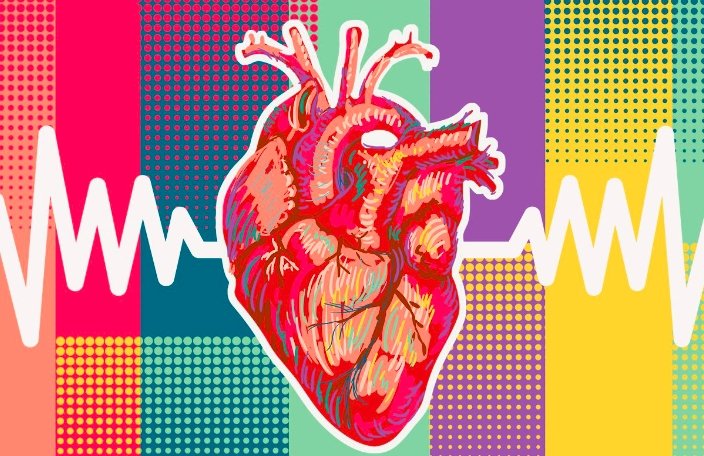The COVID-19 pandemic has taken a toll on the physical and mental health of millions of people around the world. Heart disease, the leading cause of death globally, has been especially affected by the pandemic, as many people have adopted unhealthy habits, delayed medical care, or suffered from the long-term effects of the virus. This February, during American Heart Month, experts and organizations are urging people to reclaim their rhythm and take back control of their heart health.
Why Heart Health Matters More Than Ever
Heart disease is a broad term that includes various conditions that affect the heart and blood vessels, such as coronary artery disease, heart failure, arrhythmias, and stroke. According to the World Health Organization, heart disease is responsible for about 17.9 million deaths each year, accounting for 31% of all global mortality.
The COVID-19 pandemic has worsened the situation, as studies have shown that people with heart disease are more likely to develop severe complications or die from the virus. Moreover, the pandemic has disrupted the delivery and access of essential health services, leading to delays in diagnosis, treatment, and prevention of heart disease. Additionally, the pandemic has increased the levels of stress, anxiety, and depression among the population, which can negatively affect the heart and brain health.
Therefore, it is crucial to take care of your heart during these challenging times, as it can improve your quality of life, reduce your risk of complications, and protect your overall well-being.
How to Reclaim Your Rhythm and Improve Your Heart Health
Reclaiming your rhythm means finding a balance between your physical, mental, and emotional needs, and creating healthy habits that work best for your life. There are many ways to improve your heart health, but here are some of the most important ones:

- Eat a healthy diet: A balanced diet that is rich in fruits, vegetables, whole grains, lean proteins, and healthy fats can lower your blood pressure, cholesterol, and blood sugar levels, and prevent obesity, diabetes, and inflammation, all of which are risk factors for heart disease. The American Heart Association recommends following the Heart-Check mark, a symbol that identifies foods that meet the nutritional standards for heart health.
- Be physically active: Physical activity can strengthen your heart, improve your blood circulation, lower your blood pressure, and help you maintain a healthy weight. It can also boost your mood, energy, and immune system, and reduce stress and anxiety. The American Heart Association suggests doing at least 150 minutes of moderate-intensity aerobic exercise per week, or 75 minutes of vigorous-intensity aerobic exercise per week, or a combination of both. You can also add some strength training and flexibility exercises to your routine. Some examples of physical activities that are good for your heart are walking, jogging, cycling, swimming, dancing, and gardening.
- Quit smoking and vaping: Smoking and vaping are among the most harmful habits for your heart, as they damage your blood vessels, increase your blood pressure and heart rate, and raise your risk of blood clots, heart attack, and stroke. They also expose you to harmful chemicals and toxins that can impair your lung function and make you more susceptible to infections, including COVID-19. Quitting smoking and vaping can improve your heart health and lower your risk of many diseases. The American Heart Association offers various resources and tips to help you quit for good.
- Manage your stress: Stress can have a negative impact on your heart health, as it can trigger the release of hormones that increase your blood pressure, heart rate, and inflammation, and make you more likely to engage in unhealthy behaviors, such as overeating, drinking, or smoking. Stress can also affect your mental health, leading to depression, anxiety, or insomnia, which can further harm your heart and brain. Therefore, it is important to find healthy ways to cope with stress, such as meditation, yoga, breathing exercises, music, hobbies, or social support. The American Heart Association provides some useful advice and tools to help you manage your stress.
- Get regular checkups: Regular checkups can help you monitor your heart health and detect any signs of problems early, before they become more serious or life-threatening. You should check your blood pressure, cholesterol, blood sugar, and body mass index (BMI) regularly, and consult your doctor if you have any concerns or symptoms. You should also follow your doctor’s recommendations regarding medications, treatments, or lifestyle changes. Moreover, you should not delay or avoid seeking medical care if you need it, especially if you have chest pain, shortness of breath, or other signs of a heart attack or stroke. The American Heart Association explains how to recognize and respond to these emergencies.
How to Celebrate American Heart Month and Spread Awareness
American Heart Month is an annual event that aims to raise awareness and educate the public about heart disease and its prevention. It is also an opportunity to celebrate and support the efforts of individuals, communities, and organizations that are working to improve heart health and save lives. Here are some ways to get involved and make a difference:
- Wear red on February 4: The first Friday of American Heart Month is National Wear Red Day, a campaign that highlights the impact of heart disease on women, who are often underdiagnosed, undertreated, and unaware of their risk. By wearing red, you can show your solidarity and support for the women in your life who are affected by heart disease, and encourage them to take charge of their heart health. You can also share your story, donate, or join the Go Red for Women movement, an initiative of the American Heart Association that empowers women to fight heart disease.
- Learn and teach Hands-Only CPR: Hands-Only CPR is a simple and effective technique that can save someone’s life in case of a cardiac arrest, which is when the heart stops beating suddenly. It involves two steps: calling 911 and pushing hard and fast in the center of the chest until help arrives. Hands-Only CPR can double or triple the chances of survival for a cardiac arrest victim, but only about 40% of them receive it from a bystander. Therefore, it is vital to learn and teach Hands-Only CPR to your family, friends, and community, and be ready to act in an emergency. The American Heart Association offers online and in-person courses, videos, and resources to help you learn and teach Hands-Only CPR.
- Participate in online and local events: There are many online and local events that you can join or organize to celebrate American Heart Month and promote heart health. For example, you can participate in webinars, podcasts, or social media campaigns that feature experts, survivors, and advocates of heart health. You can also host or attend virtual or in-person workshops, seminars, or fundraisers that educate and inspire people to take care of their hearts. You can also volunteer or donate to organizations that support research, education, and advocacy for heart health. You can find and register for some of these events on the American Heart Association’s website.
By following these tips and suggestions, you can take care of your heart, reclaim your rhythm, and celebrate American Heart Month. Remember, your heart is the most vital organ in your body, and it deserves your attention and care. By improving your heart health, you can also improve your overall health and happiness.













